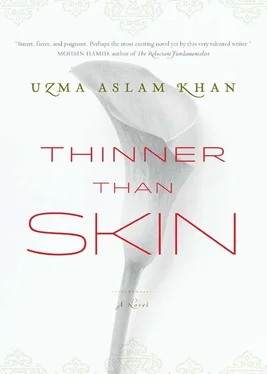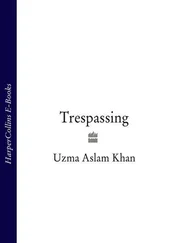It was hours later, after returning with the animals and herding them into the enclosure for the night, that he noticed. He came into their hut to find her weeping. This time, she only wept because of the physical ache. A current was tearing up her right arm, and, though her left hand tried to squeeze out the pain, the current was strong. It fought her like a snake, his teeth to her blood, while her eye noted, with a precision separate from the rest of her, the way the wrist kept swelling and changing color.
Suleiman kneeled. It was not an easy position for him. “What good would it be?” he whispered, “me with a broken leg and you with a broken arm?”
She thought this funny. As the colors on her skin deepened, she stifled a laugh and the spasm caused the current to shoot through her arm with heightened intensity, causing her to clench her teeth in pain, a gesture she was certain made her look like the mare Namasha, which only made her chuckle and choke and grimace again.
“It is all my fault!” he said, taking her fingers gently in his, tears licking his long lashes. Though he did not say exactly what all, he did not need to. At that moment, she was glad for both the men she loved, the one who wept, and the one who fought.
The next day, her wrist sticky with Suleiman’s balm for broken bones and cradled in a cloth like a child, the other one showed up again. This time, he waited for her outside the hut, near the waterhole. If he had heard about her injury, it was not why he was here. His reason was to tell her that he would either send one of his men to accompany the foreigners north, or do it himself. He would let her know the result. The result of what? she wondered, but instead asked the question to which she already knew the answer.
“How will I know?”
“Through whisperers and runners, Maryam. The way we always survive.”
From inside his good clothes he took out a bottle of clear liquid, unscrewed the top, and drank. He eyed her over the bottle. “Your son, Younis, does he talk to them?”
“Who?”
“The police. They show no sign of leaving.”
“What would he talk to them about?”
“Whatever they want him to say.”
“He has nothing to do with them.”
He drank. The bottle had a red label and was half empty.
“He can come with me, Maryam. After my work here is done. I can find him a job. As a runner — for jade, or a different kind of silk.”
“He stays with me.”
“There is money to be made. And he will be safe. Safer than here.”
“He stays with me,” she repeated, steel in her voice.
“It was just an offer.” He tilted the bottle in her direction, his eyes equally glassy. “Vodka will ease your pain, Maryam.”
So, he was now offering her liquor, in place of honey. Did it taste different from juniper brandy? Many men liked brandy in their cups, in place of tea. Many women liked it too. Once, as a child, she had spied a cup left behind by her mother. When Maryam lifted it to her nose, without warning, her tongue had licked the bottom clean. It had made her blood surge with a warm, acid sweetness. Afterward, knowing that her mother’s nose was even keener than her own, she had rubbed her gums with milk.
But something in the way Ghafoor now tilted the bottle toward her made it a worse trespass than her own secret experiment. He had never looked at her this way, not in all the times he had come to her when she was a child. She pushed his hand away.
He began telling her more stories, about the people of the steppe, their drink, their food. After boiling the head of a sheep, they divided it between the family. Ears went to the children, eyes to those who would not see, tongue to those who would not speak. “Guess which part would go to you?” he asked.
She watched his eyes shine with a silver glint that made her think of boiling heads. On he went, spewing big words in her face about the world from which he had descended. And she was back to saying nothing more to him.
“They are strong. Stronger than us. What do you think they do, Maryam, when free grazing lands are turned to state farms? Do they become slaves?” His eye was turning from silver to red. “Never! Once we were free to graze in the hills around Saiful Maluk. But even there we are no longer safe. Anyone can rob our cattle, even our children. We have no fight in us! We have no leadership! We have no pride!”
The bottle was dry. His eyes were wet. He was teetering close to the waterhole.
She was suddenly enraged. Get on with the plan , she wanted to say. Get on with it. Whatever it is. Your talk is meaningless .
“People here do not listen to me, Maryam. I came back at great risk to myself.”
Again he waited for gratitude; again she withheld it. He plunged his fist inside the waterhole, wasting the good drink. He looked like he needed cradling more than the wrist tied to her chest, the one he had not even noticed.
“They drove me away. But I am back! I will prove what I can do!”
“Prove it then,” she hissed, spinning on her heels and walking away. Without looking back she added, “Your war with every man in uniform should leave us strong, not weak.”
After a long pause she heard his reply. “The ones in plainclothes are worse.”
She did not look back at him, and two days later, she saw that the flowers he had left her lay wilting in her shrine.
If she had looked back, and kept on looking, she would have seen Ghafoor slip away, far away, to walk the winding valley of his youth.
First, a few miles north, past Kawai, where the road ascended steeply, and it felt good, the way his thighs tightened to brace for what he knew would soon be a much steeper ascent. If he looked to his left he could see Musa ka Musalla, the prayer mat of Moses. He did not know a single person who could explain why the mountain was called this, for it did not look much like a prayer mat at all. What he did know was that he was unlikely to see it again. So he bowed before it, from one prayer mat to another.
He contemplated taking the road to his right, toward Shogran, the forest in the sky, but he did not like the idea of meeting the city folk who spent their summers there. He turned around and went back down, toward Balakot, intending to head all the way south to Mansehra.
He met several people along the way and some of them met his eye and some of them did not. The River Kunhar moved beside him almost the entire way, sometimes thin as a smile, sometimes wide as laughter. It was laughter that could turn seditious in the rainy season, and he could not forget the floods of 1991, when he was just a buffalo boy hoping to one day see the world. Even though the riverbed was steeply inclined, that year she had climbed to the edge of it, to unleash the worst of her mischief on the town of Balakot.
It was a fragile town; another flood or earthquake and it might not survive at all. It was already barely keeping afloat. Two years after the 1991 floods, Maulana Sufi first began imposing Islamic laws in the region. Now, many summers later, his followers were moving deeper into the forest, their camps creeping like mold. Maryam could turn her back to him all she pleased, but every herder knew that no agency really wanted to dismantle the camps. Why would they? It was thanks to them that they could keep up the fight in Kashmir and Afghanistan and, most importantly, in the forest that had once looked down from two hundred feet but that now stooped in shame. Everyone here knew it, but no one had a plan.
The sun began to dip when Ghafoor neared Balakot, still deep in thought. The refugees from Central Asia were finding brothers in those camps. And what was he — a brother to his friends or to his enemies? Were they even friends, those men, the ones who had given him rare yellow flowers in Gilgit, the ones with missing toes and soft leather palms? They had told him not to look beneath the flowers. He had not looked. He had delivered it, as promised, to a man waiting above a bend of the Kunhar that was well-known to him. It was a part of the river used for storing smuggled tree trunks. There was a knob in the rock face opposite the bend, about twenty feet high, and Ghafoor had seen the man standing there, waiting. He was from a rival tribe, and Ghafoor had not liked the exchange, not one bit. The man had given him a second, very different kind of box — slightly larger than the other and with a lid he must not even crack — and a second delivery date, after which Ghafoor must return to the men in Gilgit, with news.
Читать дальше












